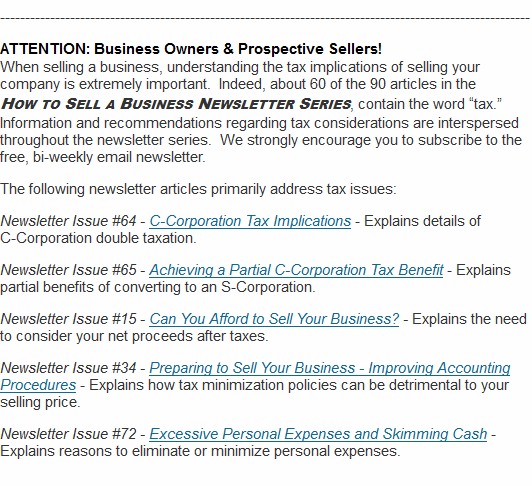Stock Sale vs. Asset Sale When Selling a Business
When selling a business, the transaction can be structured as an asset sale or as a stock sale. In an asset sale, the corporate entity is selling the assets specified in the asset purchase agreement and the sale proceeds are received by the corporate entity. In a stock sale, the shareholders are selling their stock shares in the business and company ownership is transferred “lock, stock and barrel” to the buyer. The sale proceeds are received by the shareholders. From a tax and liability standpoint, the seller and buyer usually have opposing views as to which transaction type best suits their interests. So the negotiations over the structure of a business sale transaction are never easy.
Stock Sale vs. Asset Sale from a Seller's Perspective
Especially when the business is organized as a C-Corporation, the tax implications of an asset sale are onerous, as the transaction will be subjected to double taxation. In a C-Corp asset sale, the proceeds/gain (above the tax basis) are taxed at the corporate level using C-Corp tax rates which are generally in the 34-39% range. Then when the remaining cash in the corporation is distributed to the shareholder(s), it’s taxed again as a dividend distribution.
Although S-Corporations and other flow-through entities like LLCs and Partnerships don’t incur double taxation, in an asset sale structure, they do incur depreciation recapture which can have a significant detrimental effect on the tax burden of a business sale, particularly for asset-laden businesses.
In a stock sale (or a sale of member or partner interests in LLCs or Partnerships), generally the gain is computed based on the sales price vs. the shareholder’s stock basis in those shares and is taxed at long term capital gain rates. Thus a stock sale vs. an asset sale usually provides very significant tax savings for the seller. If that is the case, then why aren’t all (or most) business sale transactions structured as stock sales? Because it’s unusual for buyers to agree to a stock sale.
Stock Sale vs. Asset Sale from a Buyer's Perspective
For two primary reasons, especially for main street businesses, buyers and their advisors, are very hesitant to consider a stock sale transaction. In a stock transaction, the buyer takes over the corporation “as is,” including all the liabilities of the corporation, whether known or unknown. Many small business corporations maintain inadequate corporate records, or they may have “skeletons in the closet” of which even the business owner is unaware. Remember, the buyer inherits all liabilities, including those that arose from past history. For buyers and their advisors, that’s scary. There’s just too much to be concerned about in many main street businesses.
In addition, in a stock sale, the buyer takes over the company’s balance sheet “as is.” In many transactions, there are a lot of fully depreciated assets on the balance sheet. Under a stock sale structure, the tax basis for depreciation remains the same and buyer will have very little future depreciation on the acquired assets. However, under an asset sale structure, the buyer is allowed to “step up” the value of the acquired assets to their market value and begin depreciation anew. An example might help. Let’s assume a business for sale has $500,000 worth of assets at fair market value with a depreciable life of 7 years (per IRS regulations), and that those assets are fully depreciated on the company’s balance sheet. Under a stock transaction, the buyer will forego all depreciation because the assets are already fully depreciated on the balance sheet. Under an asset sale structure, the buyer creates a new balance sheet and “steps up” the basis of those assets to $500,000 and is able to write off about $71,500/year in depreciation. At an effective tax rate of 30%, writing off $500,000 of depreciation saves about $150,000 in taxes over 7 years. That’s another valid reason buyers prefer asset sale transactions.


Stock Sales and Corporate Contracts
In some types of businesses, for instance contractors and subcontractors, contracts may exist between the corporation and its customers or suppliers. Often, those contracts are not easily assignable to a new entity. In an asset sale structure, the buyer does form a new corporate entity and it may be very difficult (or very time consuming) to successfully obtain approvals for assignments to the buyer’s entity for all the contracts in existence as of the closing date. This type of situation can provide a compelling case to convince the buyer to agree to a stock sale transaction because, in most instances, the existing contracts will not require approval or assignment since the corporation being acquired is already a party to the contract.
For a more complete understanding of the tax consequences of selling a business we recommend checking this article out: C-Corp vs. S-corp when selling a business
Disclaimer
The above content is provided for informational purposes only, and should not be construed as tax or legal advice. As it relates to a business sale, tax regulations are very complex. You should always seek the advice and counsel of an experienced and competent tax professional.





